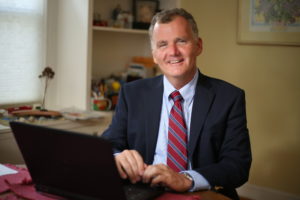
Body Matters: Learning to Listen to Ourselves
A college friend of mine took his life by suicide when he was only twenty-two years old. The death occurred just weeks before I began seminary in 1987. Theological study offered me a refuge in which to grieve Bill’s death and to try to make sense of it. I wrote papers and talked with friends. I had dreams that allowed my psyche to release the burden of guilt and responsibility. Questions asked with intensity have lingered for years. Why could I not have stopped him from making this choice? Why did he do it? Recently, as I completed a book on embodied spiritual care, I realized that theological questions which try to make sense of suffering have over time opened a deeper awareness of the need to listen to and tend to our own bodies. Such engaged listening practice allows us “to keep on keeping on” when we cannot make sense. It also attunes us to our own pain and the pain of others.
I teach listening skills in online and face-to-face classes. When I have modeled listening in the physical classroom, course participants always mention how little I speak. Given the chance, some of them would want to fill in what feels like a vacuum. Pastoral caring and spiritual listening requires attentive presence that leaves space for people to express themselves, to hear their own voices, and to sense God in the story. We also need to learn how to listen to our own bodies. During those role-plays, I pay keen attention to my body by noticing feelings and thoughts, whether and where anxiety is being experienced, and images that come to mind. The debriefing of a role-play in the classroom becomes an occasion for teaching how to pay attention to and make use of one’s own internal process. I draw on my body story and experience to teach others how to pay attention to their own.
Over the years, I have used different strategies for teaching embodied spiritual practices. In a course on the spirituality of pastoral care and counseling, I once invited participants to engage in slow meditative walking within the courtyard at my school. Zen Buddhists call this practice of listening with the body kinhin, which means sutra walk. The students willingly gave it a try, but I quickly realized my own self-consciousness around exposing the class to the watchful eyes of staff and onlookers. I have since learned the value of teaching from a place of vulnerability and giving students the choice of how they want to participate. Experience in pastoral ministry informs my sense that listening to our bodies matters for the ability to care with others. Cultivating practices such as yoga, qigong, focused breathing, body scanning, and labyrinth walking, among many other possibilities, helps to access and release frustration, stress, sadness, and anger held in the body. The practices also help us to tap into delight, hope, and joy. Tending our own body story opens listening possibilities for receiving the whole of another person’s or a community’s story and experience. Pastoral ministry calls for such listening. Seminary classes and instructors have a role in curating experiential learning to undergird it.
Online asynchronous classes offer valuable opportunities for embodied listening. In the privacy of a secure learning space without anyone watching, students may engage practices that help them tune in to their own body story and experience. On a cautionary note, I urge participants not to engage or to halt a practice if a traumatic response is hooked. This component of the class is completion graded. Full credit is given for briefly describing how or why a practice may or may not be beneficial. My observation is that experiential learning carries transformative power as students give themselves to the process. While I have fully expected some students to go through the motions on the exercises, I have been quite moved at the personal and theological insights most participants share. Some note working through reluctance or resistance to a practice only to find themselves surprised by what opens for them. Some dislike or do not connect to a particular practice and share their honest reactions. Others rediscover a practice that once sustained them. These are profound and not perfunctory reflections. I revel in reading them. Pastoral ministry calls leaders to embodied listening that is genuine and real in their encounters with others and the Holy. This teaching method facilitates listening to ourselves, to our bodies, as a base for that vital practice.
Leave a Reply